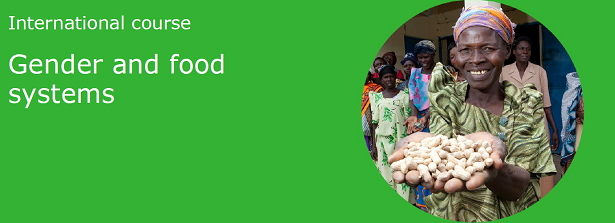
From June 24 to 28, 2019, Wageningen Centre for Development Innovation (WCDI), ActionAid and the Royal Tropical Institute (KIT) are organizing the international five-day course “Gender and food systems; partnerships as catalyst” in the Lukenya Getaway Lodge close to Nairobi. The unique partnership of the organizers brings together practical experience and academic knowledge with a policy oriented international network. The course offers strategic insights and practical solutions that speak to the need for meaningful changes in gender relations and the need to work in partnerships to achieve impact at scale.
Apply for the course at the website of Wageningen Centre for Development Innovation You will receive a confirmation and more information within a week.
Download the flyer of the course.
Why Gender in Food Systems?
In 2018, women still have fewer economic opportunities than men, less access to education, insecure land rights and less political representation. What’s more: the situation is getting worse. According to the 2016 Global Gender Gap report by the World Economic Forum, the economic participation gap between women and men is widening.
Considering extensive evidence that gender equality contributes to resilient and robust food systems as well as a growing demand to make our societies more equal, the case for gender equality has never been clearer. The UN Sustainable Development Goal 5 is a transformative
agenda aiming for gender equality, ending discrimination against women and girls, and realizing their empowerment.
Respecting/fulfilling gender equality is not just in line with fundamental human rights, it is also a strategic investment in all aspects of food systems such as reducing food losses, increasing agricultural productivity, enhancing dietary diversity and increasing education levels for the next generation.
The realization has come that partnerships and networks are crucial to ensure scalable impact in food systems. Also in the work to progress gender equality, networks and partnerships have become common practice for change. Achieving sustainable gender results requires alignment and synergy between actors from private, public and civic backgrounds. Power analysis and capacity development are crucial to enable even the most marginalized actors to participate – especially when they are women.
Course content
This five day course consists of three interrelated modules. We set the scene with short keynotes on the trends and recent insights on the relationship between achieving gender equality, creating effective partnerships and rethinking power relations in our food systems.
In module two participants learn how to design and facilitate a strong partnership that intentionally and meaningfully engages with women’s empowerment and gender equality. This module builds on a gendered version of the recently published Multi- Stakeholder
Partnerships Guide. From analysis we will move to design: participants will develop their own Gendered Theory of Change based on their own real-life cases.
Finally, in module 3 participants select what they need for their own case to develop a tailor made action plan, including key monitoring indicators and a strategy building or strengthening their gender partnership.
Course methods
This course is based on adult education principles, including the use of participants’ own real life case studies. Other principles are participatory education, mutual respect, strategic reflection and interdisciplinarity.
Examples of methods and tools that will be used in this course are: Gender analysis frameworks; Stepping the line; Story telling; Theory of Change; Institutional scan; Visioning; Power ranking; Role play (on gender conflict); Nonviolent communication; Deep Democracy; Four
quadrants of Change; Balancing results and relationships.
Participants will learn to
- Formulate your own gender ambition in relation to the recent debate on Gender equality and food systems;
- Decide which tools to use to design, facilitate and monitor gender progress in your partnership or network;
- Upon return back home, mobilise capacities and conditions to take others (in your own organisation and beyond) along in your gender
ambitions.
Who should attend this course?
- Mid-career professionals working at (social) enterprises, NGO’s, knowledge institutes, policy units and/or governments who are struggling to make a meaningful change in gender relations in their partnerships and networks;
- Decision-makers in (public or private) organisations or (social) enterprises who are responsible for setting up new partnerships,
programmes or networks and who want to be gender responsive; - Leaders in gender equality who struggle to make their gender partnership work;To facilitate cross-learning, we encourage people with experience in either partnerships or gender equality to apply.
The organizers
- Wageningen Centre for Development Innovation has a vast experience in participatory and handson professional training and facilitating multi-stakeholder partnerships.
- Royal Tropical Institute KIT works on the integration of a gender equality perspective from a rights and empowerment perspective,
across a range of sectors and fields, including agriculture, food systems, nutrition, financial inclusion, sexual and reproductive health and rights, and women’s leadership. - ActionAid is a global movement of people working with women across the world to identify the changes they want to see and to empower them to claim and defend their rights.
- This event has passed.

